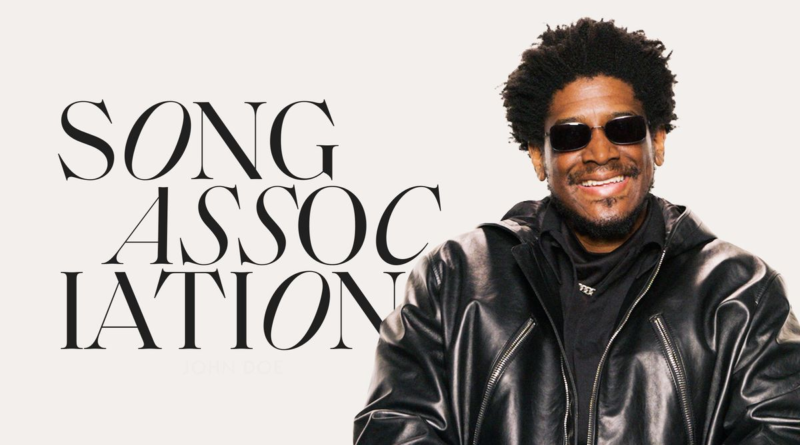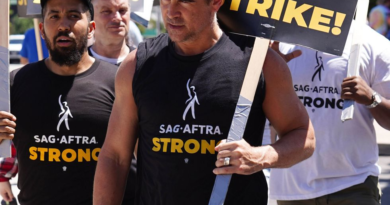Sara Ramirez Knows Che Diaz Isn’t Perfect. They Don’t Have to Be.
There are pariahs, and then there is Che Diaz—the divisive non-binary character who stole headlines during the first season of And Just Like That… The much-buzzed about Sex and the City sequel had its fair share of press during its first season’s airing on Max (née HBO Max). Notably, there was the palpable absence of Kim Cattrall’s Samantha Jones, followed by the shocking killing of Mr. Big via Peloton. Then there was the cancelation of Chris Noth, who plays Mr. Big, after multiple allegations of sexual assault. And somehow, by the end of the season, the biggest story was Che Diaz, the love interest blamed for the undoing of the years-long marriage between fan-favorite Miranda and her husband Steve. And at the center of that was the actor tasked with playing them, Sara Ramirez.
Eighteen months have gone by since the premiere of the series that dared revisit where Carrie Bradshaw’s Manolo Blahniks once walked. Ramirez returns to the second season to reprise Che, following an announcement at the end of last season that Che had a pilot picked up and would be moving to Los Angeles. They invited the newly-liberated Miranda to come along with them, who jumped at the opportunity for something fresh.
But here in our reality, Ramirez seems acutely aware, yet dismissive, that Che is a lightning rod for criticism. Even as we wade into the conversation about queer representation and what playing Che means, Ramirez hits the party line hard. “I don’t write the show. I don’t produce the show,” they say. “I’m an actor for hire, so I’m just really clear about what my position is when I’m hired to play a role.”
More From ELLE

That said, it’s hard not to have the conversation about the pressure of playing this character. It’s not just Che Diaz on Ramirez’s resume. There’s also Grey’s Anatomy’s Callie Torres, who helped kick down doors for bisexual visibility and normalize same-sex relationships on network television. Seven years after their departure from Grey’s, Ramirez has been tasked with a different kind of conundrum: What can you do, if anything, with a marginalized character who has been called indefensible, cringe, and problematic?
Speaking over video chat, Ramirez admits that Che has a certain brashness while operating in the first season of And Just Like That…. They’re brazen and unapologetic, if not a bit “performative.” Their word, not mine. I mean, this is a person who fingered Miranda Hobbes in Carrie’s kitchen, days after Carrie had hip surgery. That’s a certain level of bravado that tangos closer to absurd than bold. But Ramirez makes the argument that Che is no angel. Who do we expect them to be?
“The women on the show get to be messy and imperfect, likable and unlikable, so of course, Che also gets to be imperfect, complex, likable, and unlikable. You know, the LGBTQIA+ community isn’t perfect, and we shouldn’t have to be,” they say. “Ultimately what we’re seeing is a character that is reflecting back to us that none of us are above our own conditioning.”
In the first five episodes of season 2, Che finds themselves in the world of Hollywood and its meticulous value judgments. In New York, Che could run a podcast and hold cis, white men’s feet to the fire with a certain amount of authority. This season, however, Che is finding themselves in the spotlight of another value system, with network executives scrutinizing their hair color, their heritage, and their weight. When I ask Ramirez whether Che’s experience resonates with them, they don’t mince words.
“I think the entertainment industry for the most part is capitalism. And capitalism isn’t really looking to affirm us in our multitudes,” they say. “It’s looking to flatten us into something that’s easy to digest and spit back out. What’s really beautiful about that opening up of humanity for Che is it shows us that they are not above their own conditioning. Most people aren’t.”
And that’s where Che’s depiction becomes its most complex. This season, Tony Danza joins the cast as…Tony Danza…as Che Diaz’s television father. But the sheen quickly wears off when Che is faced with a conundrum at the hands of their superstar daddy. Danza reimagines Che’s character’s backstory (Danza, who is famously Italian, works with the network and erases the Irish part of Diaz—and Ramirez’s—identity), leaving Che at a major bump in the road.
After all, throughout season 1, Che was the character who was uncompromising. They grimaced as Miranda snuck out of an equal rights rally, afraid that her son might see her in attendance. To be Che in season 1 is to be steadfast and assured. But when their big break comes, their authenticity is tested. That split makes Che more interesting, and sympathetic, than they’ve ever been. There are moments when your heart goes out to them, like when Che is forced to play a non-binary character whose identity is often played for laughs. Or when their character is skewered by a focus group ahead of the pilot.
That said, there are also the moments when Che continues to be the worst, like when they completely dismiss Miranda’s fear that her son might commit suicide. Or when the 46-year-old wakes Miranda in the wee hours of the morning while looking for rolling papers for their friends. Che…well, Che remains a mixed bag.
When I ask Ramirez’s opinion about Che’s reaction and how they protect themselves from the criticism, they reiterate, again, that Che is not real. “It’s a fictional character. And it’s interesting since the advent of reality TV that people are so invested in fictional characters to the point where they think they’re real.” The line between reality and fiction has always been a blurry one though. It’s what makes television and film so alluring.
Back in its original run, Sex and the City became known for its countless cameo appearances. Most (including Bradley Cooper and Alanis Morissette) played bit characters, but on occasion, there were one-to-one parts, like when Heidi Klum appeared as herself. Jump forward to the present, it’s Danza, who in a lot of ways, becomes Ramirez’s prime scene partner. It’s exciting for Che and Ramirez alike because, c’mon, whether it’s real Tony Danza or fictional Tony Danza, this is Tony Danza. Who’s the Boss! Taxi!
“The guy is such a beautiful showman. He tap dances, he plays the ukulele,” they remember of their time on set together. “He tried to teach me a tap dance number between takes when we were on the set of the pilot.” The lessons didn’t stick for the Tony award-winner, but the sentiment did. “I’m just so grateful for that guy. Wait until you see him.”
But Danza (or, rather, the fictional version of him) is one of the problems. So is the studio behind Che’s pilot. That’s when Ramirez and I turn back to the conversation of representation. There’s such an undeniable power that comes in seeing yourself represented on television, but as the fight for visibility continues, there’s also the question of how much weight can rest on the shoulders of visibility. I mean, consider the current drag bans coming down across the United States. RuPaul’s Drag Race, until this year, had a six-year chokehold on the Emmy for Best Reality TV Show competition. To what extent should we hold visibility accountable for progress?
The importance of Che Diaz is pulled back into focus. In Rolling Stone, E.J. Dickson wrote in defense of the character, “Che is intended to serve as a representation of a rapidly evolving society that is leaving these women behind. And whether by design or not, the writers’ inability to fully breathe life into the character, or render them anything beyond a series of traits loosely associated with ‘woke’ queer people, is one of the purest crystallizations of that mission.”
But what Ramirez gets at more directly is that whether we exalt or damn Che Diaz is not the point. Visibility and representation, whether well-intended or not (a subject of debate for And Just Like That… meant for at a different time), doesn’t guarantee results.
“Representation matters because it starts conversations where people are suddenly caring about these fictional characters, but how is that translating to how that same person will behave in front of a same sex couple at the store?” Ramriez asks. “There’s a disconnect happening still. I think that’s what we have to really focus on: What does justice actually look like? How do those important conversations translate into real life policies?”
As our conversation comes to a close, there are a lot of questions still up for debate: the bigger ones that ask something about us and our willingness to dissect a non-binary character with the granularity of cutting a single grain of salt away from a block. There’s the others about why, after all these years, would Miranda walk out on a guy as endearing as Steve for, as Ramirez puts it, a “self-proclaimed narcissist” like Che Diaz.
But one question that is firmly answered is that Sara Ramirez doesn’t not believe they are Che Diaz. They are more introverted. More measured. More weary of the world’s reaction than Che Diaz is. “Che takes a lot of energy to play. I was exhausted on the days where I go in and play Che all day,” they say with a laugh. “It just requires a certain level of energy, you know? But I always tap into empathy for the characters I play. I have to, as an actor. But it was really fun to inhabit a character that speaks their unapologetic truth, who is just moving through the world, embracing that life is nonlinear.”
As for handling the vitriol—and the internet is good for vitriol—Ramirez creates boundaries. They say they have to, to preserve the character, but more so for their own mental well-being. “I think there’s a lot of reclaiming of the self when you’re done playing a role. That’s really important,” they say. “That’s the kind of self care I engage in when I play characters, so that I can get back to my real life when I’m done.”
After we hang up, one adage that Ramirez offers keeps bouncing around my head: “LGBTQIA+ people don’t have to be perfect or likable for us to root for their humanity.”
As for whether or not the public agrees, the jury is still out.
Writer
Justin Kirkland is a Brooklyn-based writer who covers culture, food, and the South. Along with Esquire, his work has appeared in NYLON, Vulture, and USA Today.







